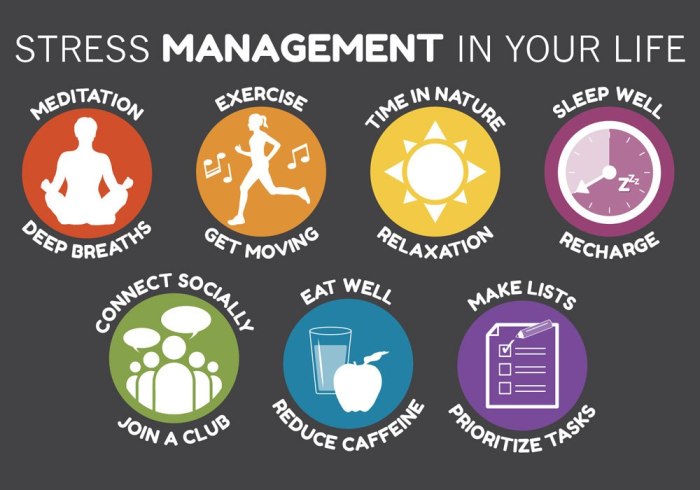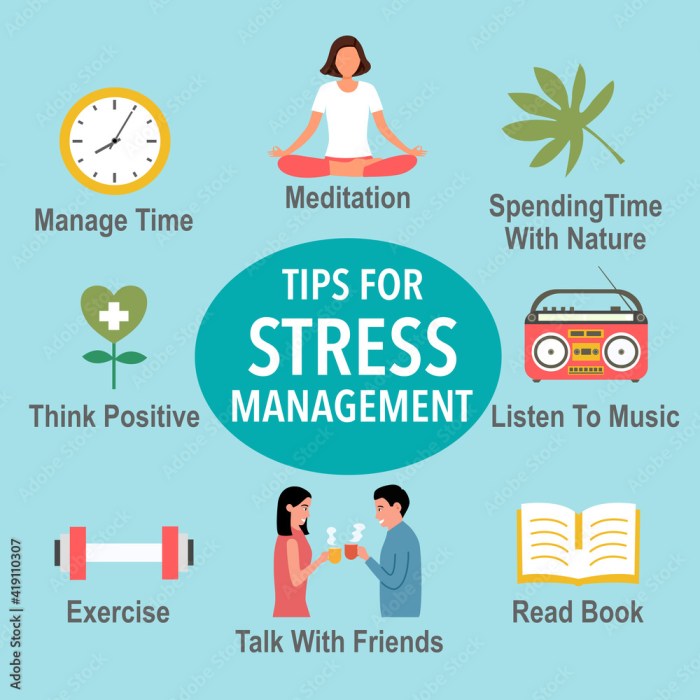Stress Management Tips: Keep Calm and Stay Cool in High School opens the door to a world of chill vibes and good vibes, where we’ll explore how to navigate the ups and downs of stress like a boss. From understanding stress to effective techniques, get ready to level up your stress game.
Understanding Stress

Stress is a natural reaction to the demands of life, both mental and physical. It can have a significant impact on our overall health, affecting not only our mental well-being but also our physical state. Understanding stress is crucial in managing it effectively.
Common Causes of Stress
- Work-related pressures and deadlines
- Relationship issues
- Financial worries
- Health concerns
- Major life changes or events
Acute vs Chronic Stress
Acute stress is short-term and is often triggered by a specific event or situation, such as a job interview or a deadline. Chronic stress, on the other hand, is long-term and can result from ongoing issues like financial problems or a difficult relationship.
Manifestation of Stress
- Physical symptoms like headaches, muscle tension, and fatigue
- Emotional signs such as irritability, anxiety, or feeling overwhelmed
- Behavioral changes like changes in eating or sleeping patterns
Importance of Stress Management: Stress Management Tips
Stress management is crucial for maintaining overall well-being in today’s fast-paced world. Failure to address and manage stress can have detrimental effects on both physical and mental health, impacting every aspect of our lives.
Impact on Productivity and Relationships
Unmanaged stress can significantly reduce productivity levels, leading to decreased focus, motivation, and efficiency in completing tasks. This can result in missed deadlines, errors, and poor decision-making, ultimately affecting one’s professional reputation and career advancement. Additionally, stress can strain relationships with family, friends, and colleagues, as it may lead to irritability, mood swings, and conflicts.
Benefits on Mental Health
Implementing stress management techniques, such as mindfulness, meditation, exercise, and relaxation techniques, can have a positive impact on mental health. These practices help reduce anxiety, improve mood, and enhance overall emotional well-being. By managing stress effectively, individuals can better cope with challenges, build resilience, and maintain a positive mindset.
Contribution to a Healthier Lifestyle
Stress management plays a key role in promoting a healthier lifestyle. By reducing stress levels, individuals can improve sleep quality, boost immune function, and lower the risk of developing chronic diseases. Maintaining a healthy balance between work and personal life, practicing self-care, and seeking support when needed are essential components of effective stress management.
Effective Stress Management Techniques

When it comes to managing stress effectively, there are several techniques that can help you maintain a sense of calm and balance in your life.
Relaxation Techniques, Stress Management Tips
One of the key ways to reduce stress is through relaxation techniques such as deep breathing and meditation. Deep breathing exercises can help calm your mind and body, while meditation can promote mindfulness and reduce anxiety.
- Deep Breathing: Take slow, deep breaths in through your nose, hold for a few seconds, and exhale slowly through your mouth. Repeat this process for a few minutes to help relax your body and mind.
- Meditation: Find a quiet space, sit or lie down comfortably, and focus on your breath or a calming mantra. Allow thoughts to come and go without judgment, bringing your attention back to your breath when needed.
Physical Activity
Engaging in regular physical activity is another effective way to reduce stress levels. Exercise releases endorphins, which are known as the body’s natural stress relievers, helping to boost your mood and overall well-being.
Remember, it’s not about the intensity of the workout, but the consistency that matters most.
Work-Life Balance
Maintaining a healthy work-life balance is crucial for managing stress. It’s important to set boundaries, prioritize self-care, and make time for activities that bring you joy outside of work responsibilities.
Remember, you can’t pour from an empty cup. Take care of yourself first.
Time Management
Effective time management is essential for reducing stress and increasing productivity. By prioritizing tasks, setting realistic goals, and creating a schedule, you can better manage your time and alleviate feelings of overwhelm.
- Use a planner or digital calendar to organize your tasks and appointments.
- Break larger tasks into smaller, manageable steps to avoid feeling overwhelmed.
Healthy Habits for Stress Reduction
When it comes to managing stress, incorporating healthy habits into your daily routine can make a significant difference in how you feel and function. From the foods you eat to the amount of sleep you get, everything plays a role in keeping stress at bay.
The Impact of Nutrition on Stress Levels
Eating a well-balanced diet rich in nutrients can help regulate your mood and energy levels, ultimately reducing stress. Foods high in antioxidants, omega-3 fatty acids, and magnesium are known to have calming effects on the body and mind.
- Dark leafy greens like spinach and kale
- Fatty fish such as salmon and mackerel
- Nuts and seeds like almonds and pumpkin seeds
- Whole grains like quinoa and brown rice
Benefits of Adequate Sleep in Stress Management
Getting enough quality sleep is essential for your body to recover and recharge, especially during times of stress. Lack of sleep can exacerbate feelings of anxiety and overwhelm, making it crucial to prioritize a consistent sleep schedule.
- Aim for 7-9 hours of sleep per night
- Create a relaxing bedtime routine to signal to your body it’s time to unwind
- Avoid screens and caffeine close to bedtime to promote better sleep
Importance of Social Connections in Coping with Stress
Maintaining strong social connections can provide a sense of belonging, support, and comfort during stressful times. Whether it’s talking to a friend, spending time with family, or joining a community group, having a support system in place can help you navigate through challenging situations.
- Schedule regular catch-ups with friends or loved ones
- Engage in group activities or hobbies to meet new people
- Seek professional help or counseling if needed to talk through your stressors